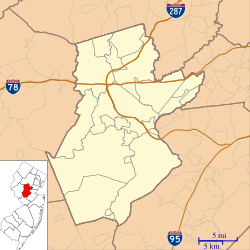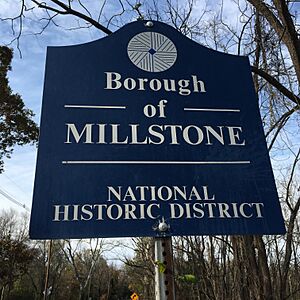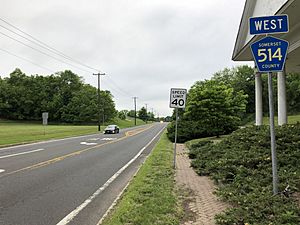Millstone, New Jersey facts for kids
Quick facts for kids
Millstone, New Jersey
|
|
|---|---|
|
Borough
|
|
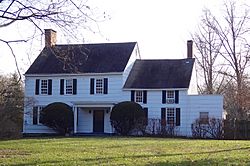
John Van Doren House
|
|
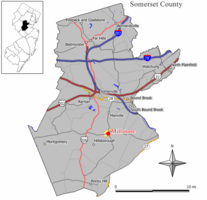
Location of Millstone in Somerset County highlighted in yellow (right). Inset map: Location of Somerset County in New Jersey highlighted in black (left).
|
|
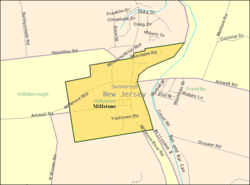
Census Bureau map of Millstone, New Jersey
|
|
| Country | |
| State | |
| County | |
| Incorporated | May 14, 1894 |
| Named for | The Millstone River |
| Government | |
| • Type | Borough |
| • Body | Borough Council |
| Area | |
| • Total | 0.70 sq mi (1.82 km2) |
| • Land | 0.68 sq mi (1.76 km2) |
| • Water | 0.02 sq mi (0.05 km2) 2.86% |
| Area rank | 530th of 565 in state 20th of 21 in county |
| Elevation | 56 ft (17 m) |
| Population
(2020)
|
|
| • Total | 448 |
| • Estimate
(2023)
|
446 |
| • Rank | 555th of 565 in state 21st of 21 in county |
| • Density | 658.3/sq mi (254.2/km2) |
| • Density rank | 423rd of 565 in state 17th of 21 in county |
| Time zone | UTC−05:00 (Eastern (EST)) |
| • Summer (DST) | UTC−04:00 (Eastern (EDT)) |
| ZIP Code |
08844
|
| Area code(s) | 732 and 908 |
| FIPS code | 3403546590 |
| GNIS feature ID | 0885302 |
Millstone is a borough in Somerset County, in the U.S. state of New Jersey. The borough was originally known as Somerset Courthouse and was the county seat. As of the 2020 United States census, the borough's population was 448, an increase of 30 (+7.2%) from the 2010 census count of 418, which in turn reflected an increase of 8 (+2.0%) from the 410 counted in the 2000 census.
Millstone was incorporated as a borough by an act of the New Jersey Legislature on May 14, 1894, from portions of Hillsborough Township, based on the results of a referendum held that day. The borough was reincorporated on March 12, 1928. The borough was named for the Millstone River (a major tributary of the Raritan River), whose name derives from an incident in which a millstone was dropped into it.
A historic district in Millstone, including 58 buildings, was added to the National Register of Historic Places in 1976. The borough possesses a military significance for 1700–1749, 1750–1799, 1850–1874.
New Jersey Monthly magazine ranked Millstone as its 7th best place to live in its 2008 rankings of the "Best Places To Live" in New Jersey.
Contents
History
Millstone, then called Somerset Courthouse, was the county seat of Somerset County from 1738 until the British burned it to the ground in 1779 during the American Revolutionary War. After the victory at Princeton on January 3, 1777, General George Washington headquartered at the Van Doren house, while the army camped nearby that night. The next day, they marched to Pluckemin on the way to their winter encampment at Morristown.
Millstone was briefly connected to the Pennsylvania Railroad when the Mercer and Somerset Railway was extended to the town in the 1870s and connected via a bridge across the Millstone River to the Pennsylvania Railroad's Millstone and New Brunswick Railroad, but that arrangement did not last into the 1880s. Remnants of the railroad bridge can still be seen.
Geography
According to the United States Census Bureau, the borough had a total area of 0.70 square miles (1.82 km2), including 0.68 square miles (1.76 km2) of land and 0.02 square miles (0.05 km2) of water (2.86%).
The borough borders Franklin Township and Hillsborough Township.
Ecology
According to the A. W. Kuchler U.S. potential natural vegetation types, Millstone would have an Appalachian Oak (104) vegetation type with an Eastern Hardwood Forest (25) vegetation form.
Demographics
| Historical population | |||
|---|---|---|---|
| Census | Pop. | %± | |
| 1900 | 200 | — | |
| 1910 | 157 | −21.5% | |
| 1920 | 178 | 13.4% | |
| 1930 | 187 | 5.1% | |
| 1940 | 252 | 34.8% | |
| 1950 | 289 | 14.7% | |
| 1960 | 409 | 41.5% | |
| 1970 | 630 | 54.0% | |
| 1980 | 530 | −15.9% | |
| 1990 | 450 | −15.1% | |
| 2000 | 410 | −8.9% | |
| 2010 | 418 | 2.0% | |
| 2020 | 448 | 7.2% | |
| 2023 (est.) | 446 | 6.7% | |
| Population sources: 1900–1920 1900–1910 1910–1930 1940–2000 2000 2010 2020 |
|||
2010 census
The 2010 United States census counted 418 people, 162 households, and 118 families in the borough. The population density was 566.5 per square mile (218.7/km2). There were 167 housing units at an average density of 226.3 per square mile (87.4/km2). The racial makeup was 95.69% (400) White, 1.20% (5) Black or African American, 0.00% (0) Native American, 1.67% (7) Asian, 0.00% (0) Pacific Islander, 0.96% (4) from other races, and 0.48% (2) from two or more races. Hispanic or Latino of any race were 3.59% (15) of the population.
Of the 162 households, 30.9% had children under the age of 18; 58.0% were married couples living together; 8.6% had a female householder with no husband present and 27.2% were non-families. Of all households, 22.2% were made up of individuals and 11.7% had someone living alone who was 65 years of age or older. The average household size was 2.58 and the average family size was 3.03.
23.7% of the population were under the age of 18, 5.0% from 18 to 24, 25.8% from 25 to 44, 29.4% from 45 to 64, and 16.0% who were 65 years of age or older. The median age was 42.8 years. For every 100 females, the population had 94.4 males. For every 100 females ages 18 and older there were 86.5 males.
The Census Bureau's 2006–2010 American Community Survey showed that (in 2010 inflation-adjusted dollars) median household income was $97,500 (with a margin of error of +/− $18,039) and the median family income was $102,708 (+/− $20,734). Males had a median income of $73,250 (+/− $8,715) versus $50,625 (+/− $15,872) for females. The per capita income for the borough was $37,678 (+/− $5,017). About none of families and 0.5% of the population were below the poverty line, including none of those under age 18 and 3.0% of those age 65 or over.
Education
Several classical schools operated in the Millstone area. Queens College was relocated to Millstone in 1780 during the war. In 1814, a two-story building called the Academy was established as a co-ed public school on the lot owned by Daniel Disborough. In 1860, the school was relocated to a newly constructed building later to be known as the Millstone Borough Schoolhouse, which then operated until 1940, after which it was known as Millstone Borough Hall. Another classical school focusing on Latin started in 1826 at the home of Dominie Zabriskie. Joseph P. Bradley, who would later become a U.S. Supreme Court Justice, also taught at a classical school in Millstone after graduating at Rutgers in 1836 and before attending law school where he was barred in 1839.
There are no public schools currently operating in Millstone Borough; students attend public school in the Hillsborough Township School District, in Hillsborough Township as part of a sending/receiving relationship. As of the 2018–2019 school year, the district, comprised of nine schools, had an enrollment of 7,457 students and 645.4 classroom teachers (on an FTE basis), for a student–teacher ratio of 11.6:1.
Transportation
As of May 2010[update], the borough had a total of 4.41 miles (7.10 km) of roadways, of which 4.01 miles (6.45 km) were maintained by the municipality and 0.40 miles (0.64 km) by Somerset County.
No Interstate, U.S. or state highways directly serve Millstone. The most prominent roads in the borough are County Route 514 and County Route 533.
Notable people
People who were born in, residents of, or otherwise closely associated with Millstone include:
- Frederick Theodore Frelinghuysen (1817–1885), United States Senator representing New Jersey and a United States Secretary of State under Chester A. Arthur
- Ferdinand Schureman Schenck (1790–1860), represented New Jersey in the United States House of Representatives from 1833 to 1837
- Charles Titus (1838–1921), Union Army soldier who was awarded a Medal of Honor for his actions in the Civil War
See also
 In Spanish: Millstone para niños
In Spanish: Millstone para niños


